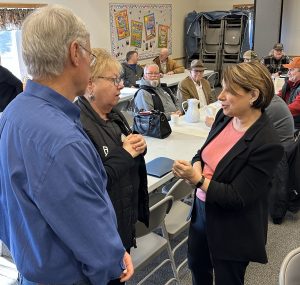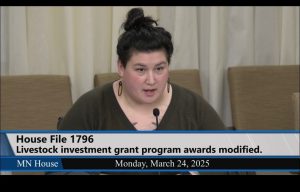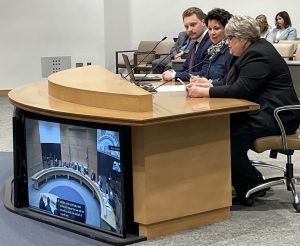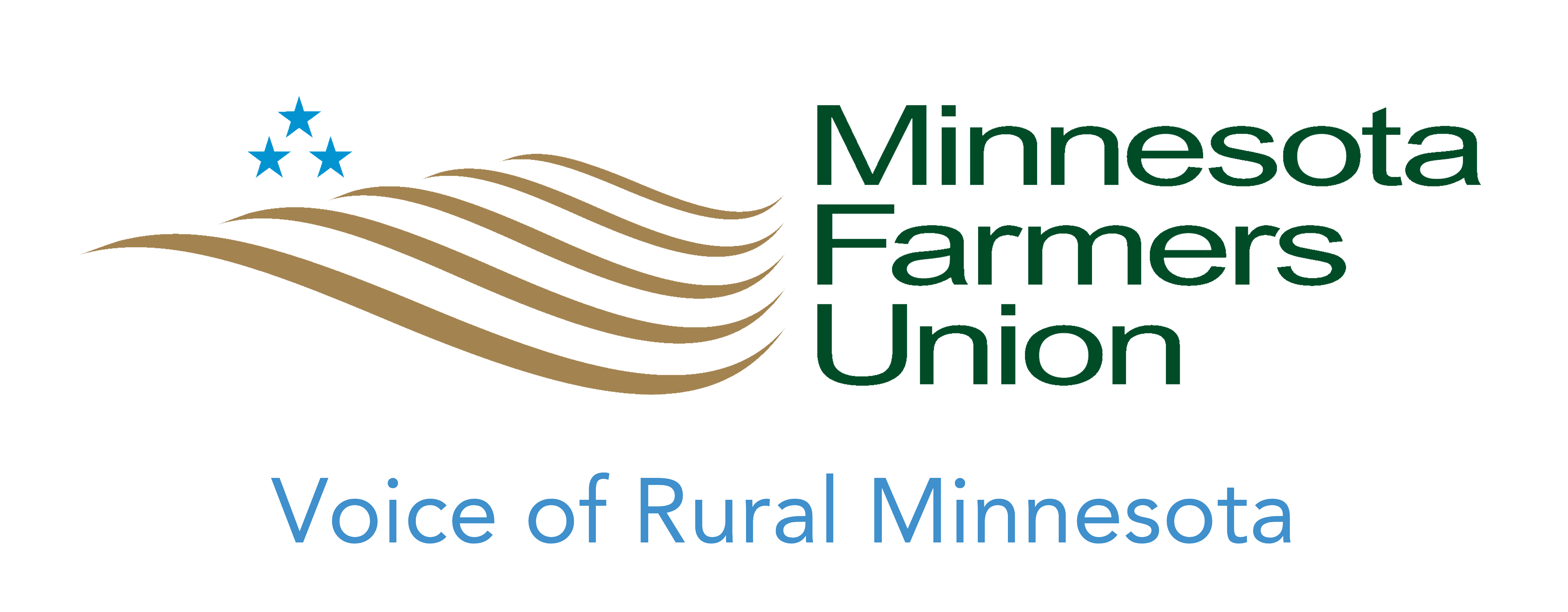Legislative Update: Deadline nears in state legislature
Since the last update, the state legislature has been hard at work considering policy and spending proposals ahead of an impending April 4th deadline to hear new proposals. Long committee hearings included consideration of making AGRI a dedicated account, fully funding the Beginning Farmer Tax Credit, eliminating sales tax on fencing equipment and establishing a state Local Food Purchasing Assistance Program.
People’s Town Halls
A highlight of the last week was U.S. Senator and Agriculture Committee Ranking Member Amy Klobuchar’s participation MFU’s People’s Town Halls hosted in Ogilvie and McGregor last Thursday. MFU President Gary Wertish has led in hosting this series of town-hall-style listening sessions to help elevate the voices of rural Minnesotans for lawmakers in Washington D.C. and St. Paul.
Upcoming listening sessions include:
- 3/27 @ 4 p.m.: Willmar, Willmar Community Center, 624 US-71 BUS
- 3/31 @ 1:30 p.m.: Oronoco, People’s Energy Cooperative, 1775 Lake Shady Ave. S.
- 4/2 @ 1:30 p.m.: Moorhead, Hjemkomst Center, 202 1st Ave N.
- 4/3 @ 1:30 p.m.: Hallock, Far North Spirits, 2045 220th Avenue
- 4/7 @ 1:30 p.m., St. Charles, St. Charles Community Center, 830 Whitewater Ave.
At the start of her day in Ogilvie, Sen. Klobuchar shared why she was glad to host Wertish as her guest to President Trump’s joint address to Congress in order to highlight the harm that a renewed trade war, USDA layoffs, and cuts to Farm Bill programs could do to farmers. Klobuchar assured members and others present that Wertish held his own in press events with other senators and helped make a strong case for more consistency from Washington. She also discussed her history of working across the aisle, including with Senate Agriculture Chair John Boozman, R-Ark., who she hosted in Minnesota in 2023—a trip which included a visit to MFU’s restaurant, Farmers Kitchen and Bar.

Sen. Amy Klobuchar visits with MFU Executive Committee Chair Carol Anderson and MFU President Gary Wertish at a People’s Town Hall.
In the town halls, the senator heard from MFU members and others about the importance of Farm Bill programs, the need for stability from Washington, challenges affording healthcare amid fears of cuts to Medicaid, the impact of federal funding cancellations on local food producers, concern about tariffs, and so much more. So far, listening sessions were also attended by staff from Sen. Tina Smith’s, D-Minn., office, Rep. Brad Finstad’s, R-1st District, office, and the Minnesota Department of Agriculture. State lawmakers were unable to attend due to responsibilities in St. Paul, but MFU has been careful to take detailed notes at all the town halls in order to deliver a report to lawmakers.
State legislative deadline is April 4
On the state level, upwards of 2,700 individual legislative proposals have been introduced in the Minnesota House alone as of March 26. That said, many won’t be formally considered by legislative committees this year. That’s because, with ample exceptions, Friday, April 4 marks the deadline for committees to consider new bills. Beyond April 4 and before the next deadline on April 11, state chairs will work to compile individual proposals into omnibus bills—large, catch-all spending and policy bills that are typically prepared for each jurisdiction and include a compilation of smaller bills heard earlier in the committee (i.e. the agriculture budget).
In anticipation of next Friday’s deadline, House and Senate Chairs are holding special committee hearings to finalize consideration of priority legislation. Agriculture is no exception, with Chair Putnam holding a marathon Friday hearing to consider a number of priority bills for MFU.
First, Sen. Kupec led in advancing a proposal to make the Agricultural Growth Research and Investment (AGRI) program a dedicated account (SF1172). This technical change would ensure that when grant projects inevitably fall through, money doesn’t just go back to the general fund. Together with allowing the fund to grow interest, this structural change could make as much as $2 million available each biennium.
“Our members are concerned about the agriculture budget . . . [and] that was the top resolution coming out of our county conventions last year,” Wertish said in his testimony before the committee. “We’re glad to be able to work with Sen. Kupec to make this structural change that does not require an appropriation but will—in effect—make more money available to Farm to School, biofuels infrastructure grants, farm business management scholarships, and so much more.

MFU President Gary Wertish
“This change is important now,” Wertish continued, “because farmers are facing a lot of uncertainty. And this change will ensure that AGRI has more undesignated funds to respond quickly to challenges.”
Second, Chair Putnam heard a proposal MFU helped bring forward to establish a state Local Food Purchasing Assistance Program (SF2430). This would continue a popular program that was recently cancelled by USDA. The program provides grants to organizations to purchase food from local farmers to donate to hunger relief organizations.
Proposals for state support were advanced by Sen. Mary Kunesh, DFL-New Brighton, and Rep. Fue Lee, DFL-Minneapolis, and in both hearings, MFU member Jane Windsperger of Kanabec County shared powerful testimony about the need for good reliable markets, particularly when you’re just starting out.
“As someone who’s working to build my farm business I know how to grow things. But the continued challenge has been finding consistent markets,” Windsperger shared with lawmakers. “With a reliable market—or even better a contract—I can lock in my seeds and other inputs, plan my crop rotations, and otherwise maximize my production.”
Fourth, the Senate Agriculture Committee considered and signaled support for Chair Putnam’s bill to fully fund Minnesota’s Beginning Farmer Tax Credit (SF1419) to ensure no farmer is turned away from this nation-leading program. Last year, and due to the new funding cap, around 40 percent of farmers didn’t receive the credit due to lack of funding.
From their own experience and for MFU, Brad Kluver of Dakota County and Tessa Sadae Parks of Rice County testified in support of expanding the value of the credit.
Fifth for MFU priorities heard by the Agriculture Committee last Friday, the committee considered Sen. Rich Draheim’s, R-Madison Lake, bill to require labelling of cell cultured meat or poultry (SF0239), giving consumers the information they need to make informed decisions about where they spend their food dollar.

Tessa Sadae Parks testified March 24.
“To ensure a level playing field, I think we should strive for that transparency across our agricultural markets and clear, informative labeling is a great place to start,” shared MFU Rice County President Tessa Parks. “I also believe that livestock can bring important benefits, helping to sequester carbon, improve soil health, and promote rural economic vitality. They bring an enormous amount of value into our communities. Consumers should have the right to choose to support this work.”
Beyond, the agriculture proposals, MFU members have worked hard to advance proposals in the tax committees.
MFU Pine County President Hannah Bernhardt and Waseca County member Pat Lienemann both provided testimony in support of a proposal led by Chair Putnam and Rep. Nathan Nelson, R-Hinckley, to exempt farm fencing from sales tax, to match other agricultural equipment and inputs.
“Exempting fencing from sales tax would be beneficial to all farmers, but I think it’d be especially helpful to beginning farmers,” Lienemann told the Senate Tax Committee. “I spent the most on fencing during that establishing year, when I had the highest expenses and fewest options for making a profit.”
In the House Agriculture Committee, Bernhardt also took the opportunity to renew MFU’s support for a proposal to pilot a $5 per acre tax credit for farms enrolled in the Minnesota Ag Water Quality Certification Program (MAWQCP) (HF363, Jacob).
“In my mind, what’s made it effective is that they employ boots-on-the-ground technical service providers to come walk your farm with you, identify risks to water quality, and make a plan to address those risks,” Bernhardt told the Tax Committee in the House. “And even more importantly that they take a wholistic view of your farm. They’re working with you to take into account your unique geography, practices, and making sure you’re doing all you can to promote water quality.”
The Senate Agriculture Committee celebrated Women in Agriculture Day at the Capitol on March 24 with MFU Outreach and Membership staff member Gail Donkers testifying to her experience as a farmer raising corn, soybeans, hogs, and Babydoll sheep.

Gail Donkers testifying on Sen. Kupec’s bill to help fund mental health outreach.
Donkers also shared support for a bill MFU helped bring forward to fund mental health outreach and farm safety work at the Minnesota Department of Agriculture (SF2809).
This investment has allowed MDA to be a national leader in helping farm families and others manage stress, prioritize their mental health, and stay safe on the farm,” Donkers told the Senate Committee. “Farming can be a stressful job—you’re often working alone, you’re dealing with huge amounts of money and tight margins, and at the end of the day there’s a lot you don’t control . . . When the stress reaches a certain point, it’s really important that there’s a resource there, easy to access.”
As always, this is just a snapshot of our legislative work. If you have questions, thoughts, or concerns, contact Stu at (320) 232-3047 (C) or stu@mfu.org.
